August 28-31, 2023
Project leader Katrin Kaldre participated in an „EEA Grants alien species study trip to Iceland, August 28-31 2023“, and gave a comprehensive overview of the project:
“Eradication of aquatic invasive species in Estonian freshwaters”
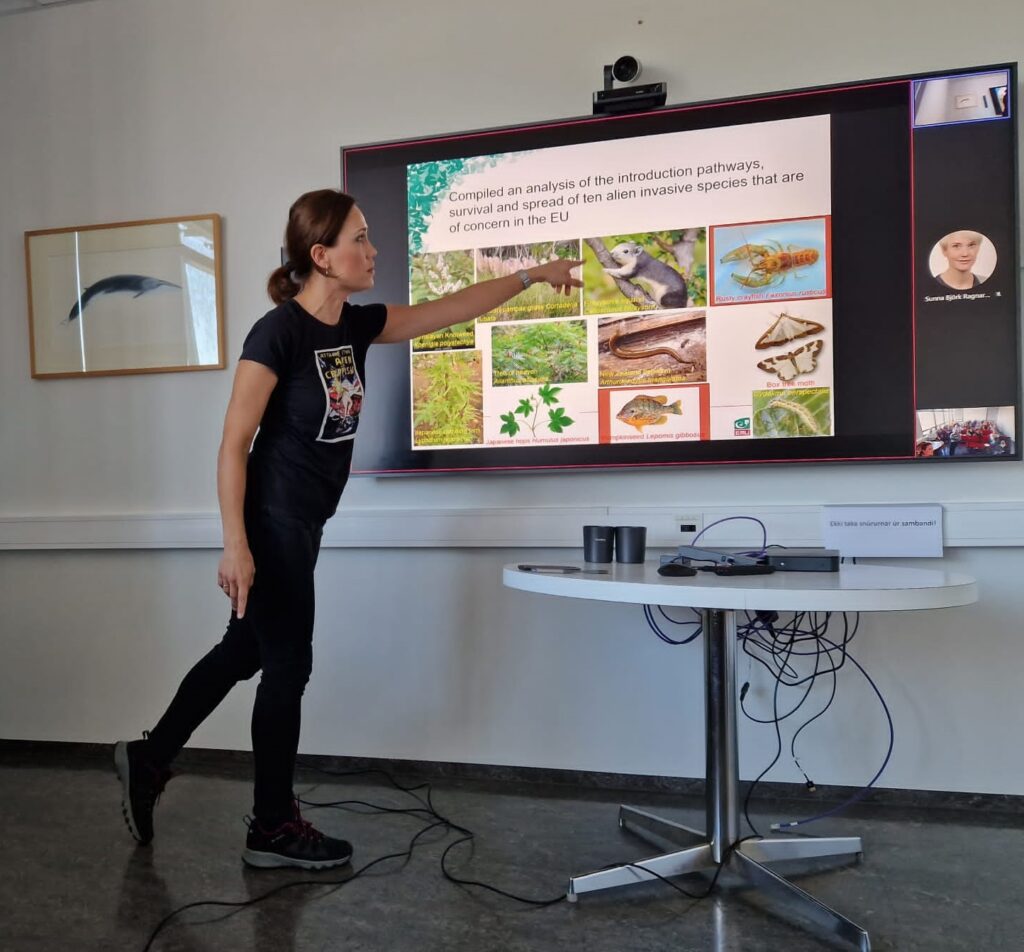
*************************************************************************
August 7-8, 2023
At the beginning of August, another project related fieldwork took place on Riksu stream in Saaremaa, where new eDNA samples were collected. Also, since traditional crayfish trapping is not sucessful with smaller sized crayfish, the effectiveness of electrofishing was tested.

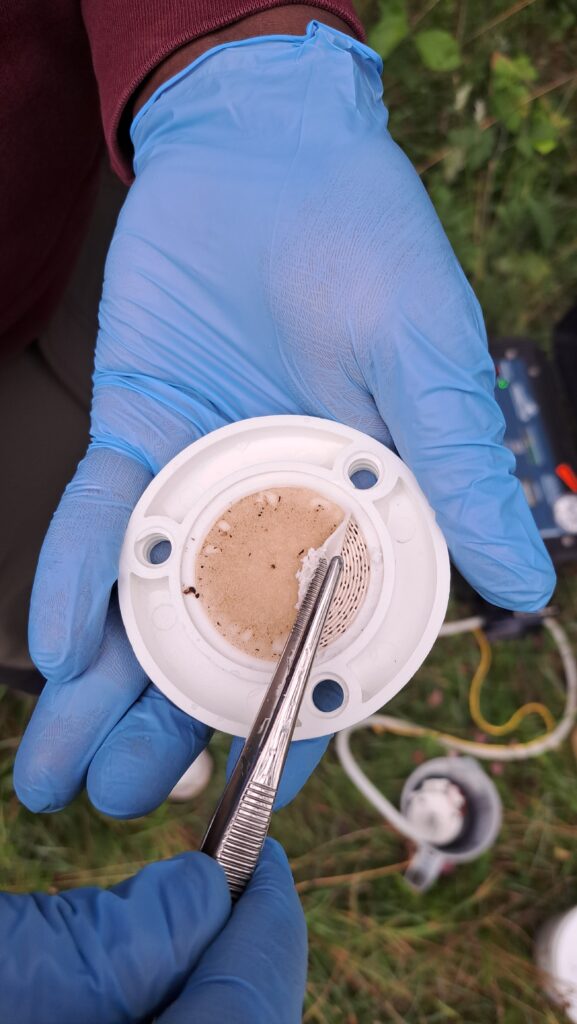

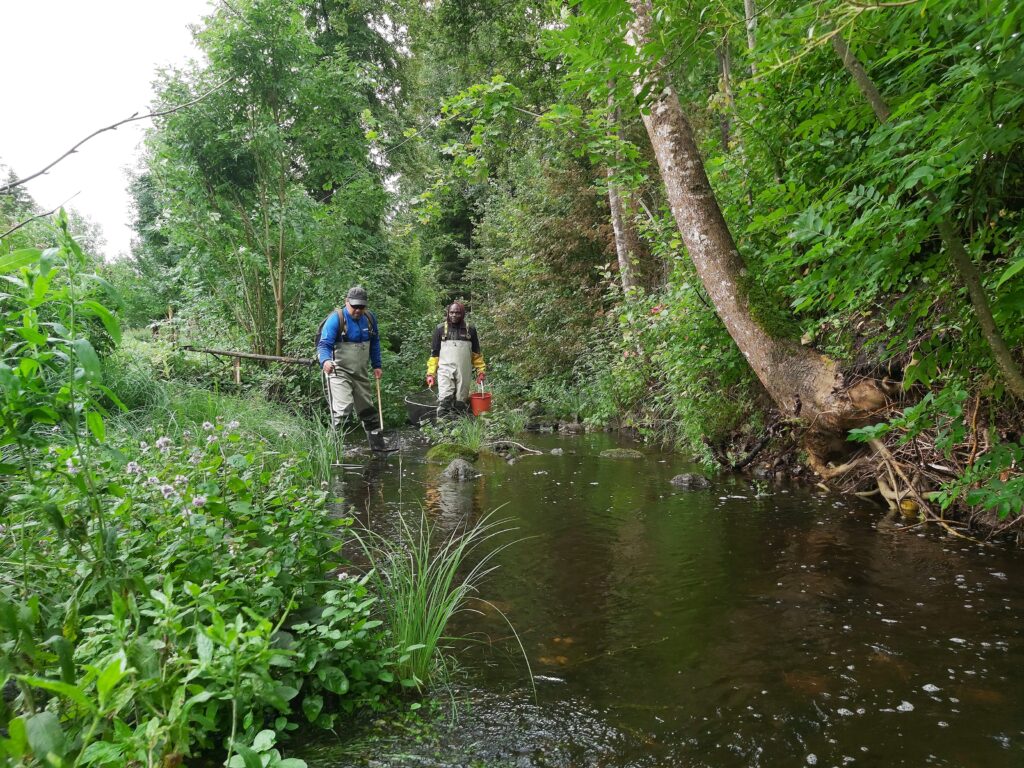
*************************************************************************
June 8, 2023
Project leader Katrin Kaldre and Sander Loite from TV-show Osoon were introducing invasive alien crayfish species on a morning TV-show called Terevisioon.
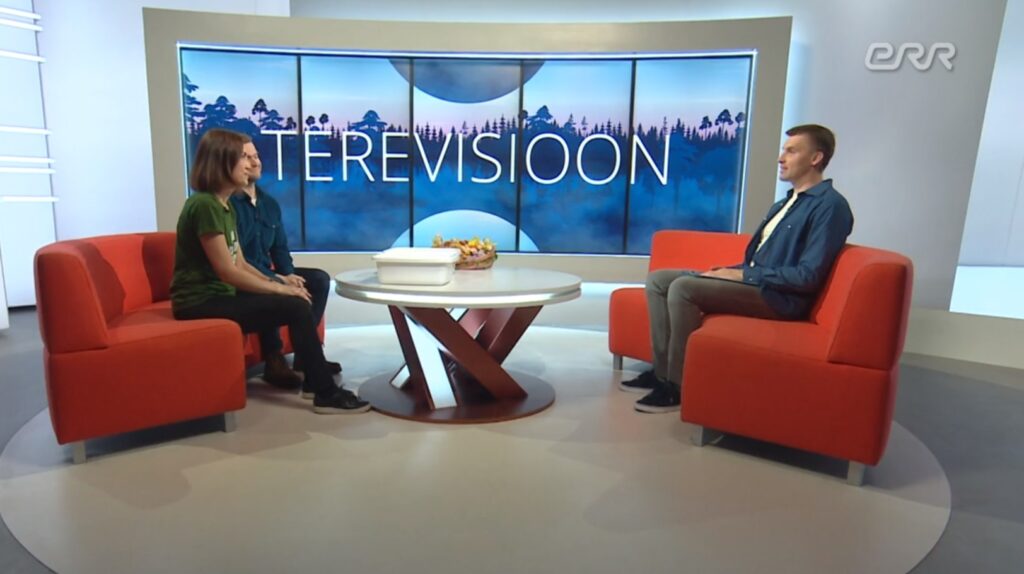
*************************************************************************
June 6, 2023
One of the project’s objectives was to map the distribution of the perennial aquatic plant Nuttall’s waterweed (Elodea nutatallii). In addition to Nuttall’s waterweed, also Canadian waterweed (Elodea canadensis) is widely present in Estonian waterbodies. However, based on morphological traits it is extremely difficult to distinguish between these two species.
To tackle this problem, couple of molecular markers were tested in spring 2023. DNA from Nuttall’s waterweed samples from 20 waterbodies were used. However, results from this test were not very promising.

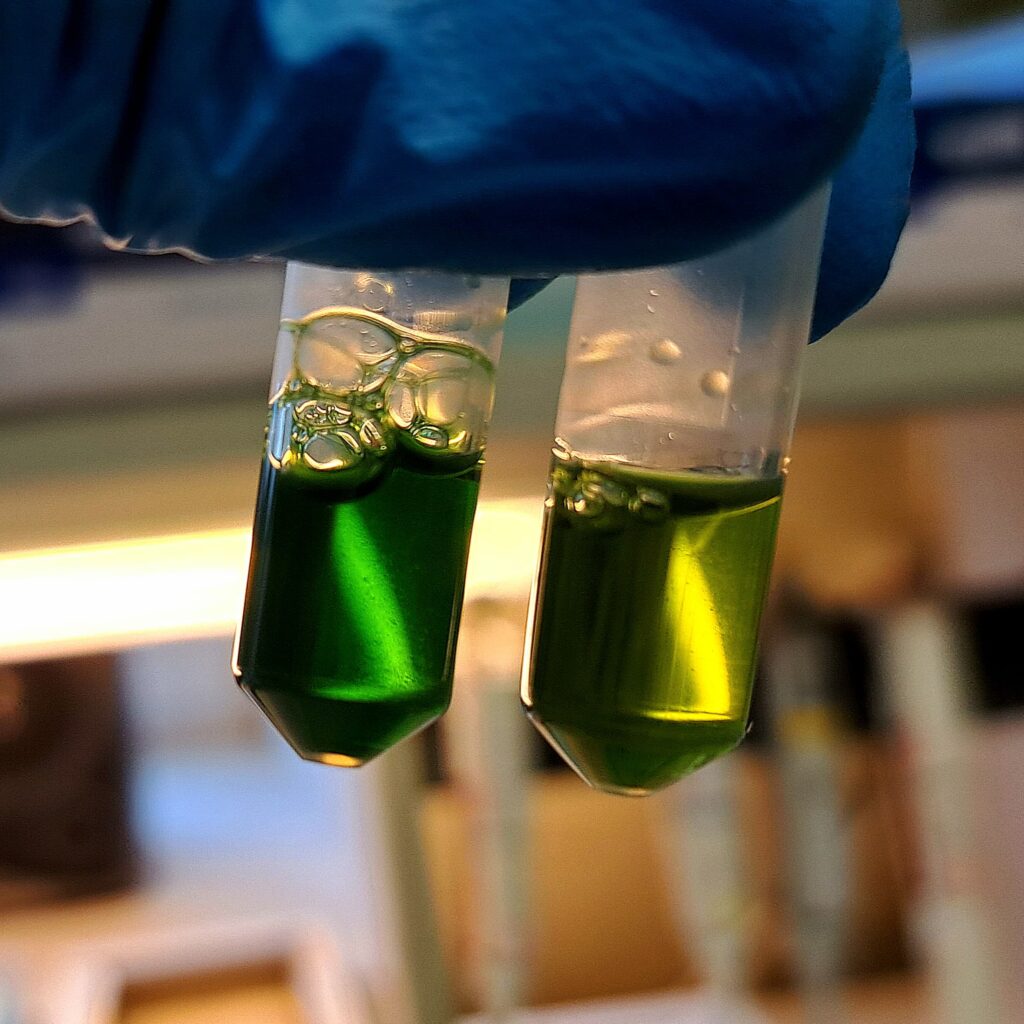
*************************************************************************
June 1, 2023
Two project related topics were defended on 1st of June at the Chair of Aquaculture.
Bachelor thesis (abstract in English) by Raigo Nagel – “The potential of the European eel (Anguilla Anguilla) in the control of alien crayfish species“;
Master thesis (abstract in English) by Egne Krillo – “Impact of fisheries on signal crayfish (Pacifastacus leniusculus) populations“.
*************************************************************************
May 22-26, 2023
The members of the alien crayfish control team participated in the 2023 Crayfish and eDNA workshop at Drottingholm in Stockholm. The aim of the workshop was to improve the detection of crayfish and crayfish plague from water samples by using eDNA methodology.
This was a joint effort to improve cooperation and knowledge exchange between universities, organisations, private companies and authorities. Particiapnts were from the Nordic countries, Estonia, Croatia, the Czech Republic, Germany, the UK, Ireland, Italy, France and Switzerland.
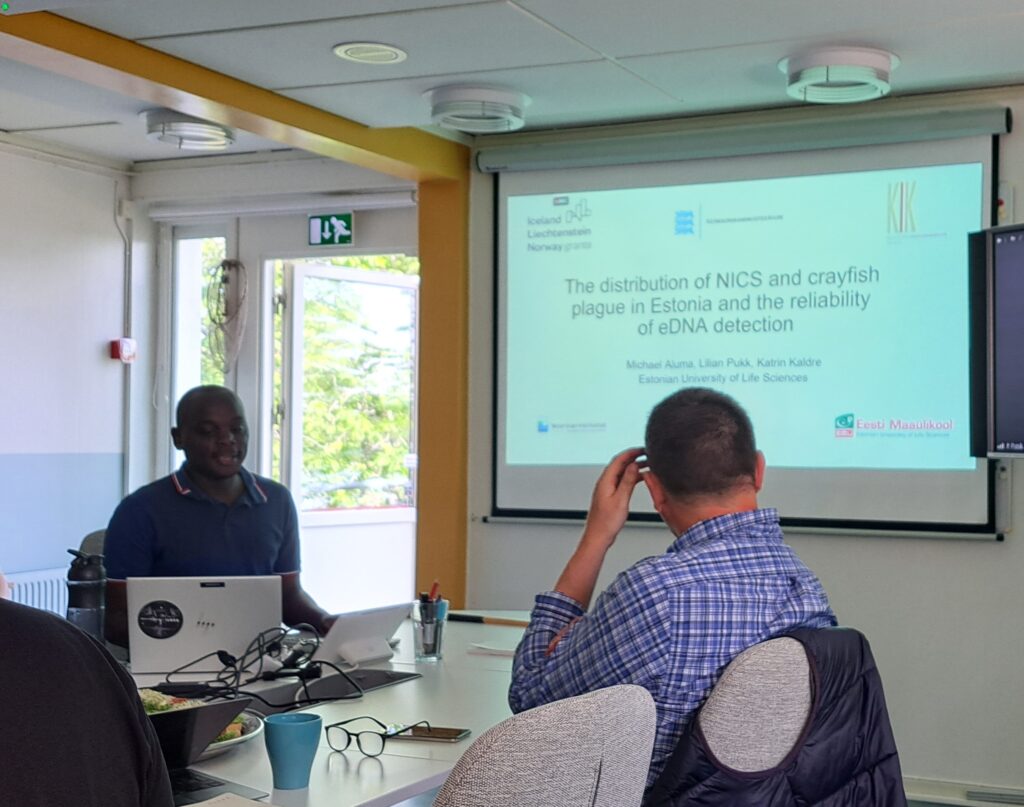

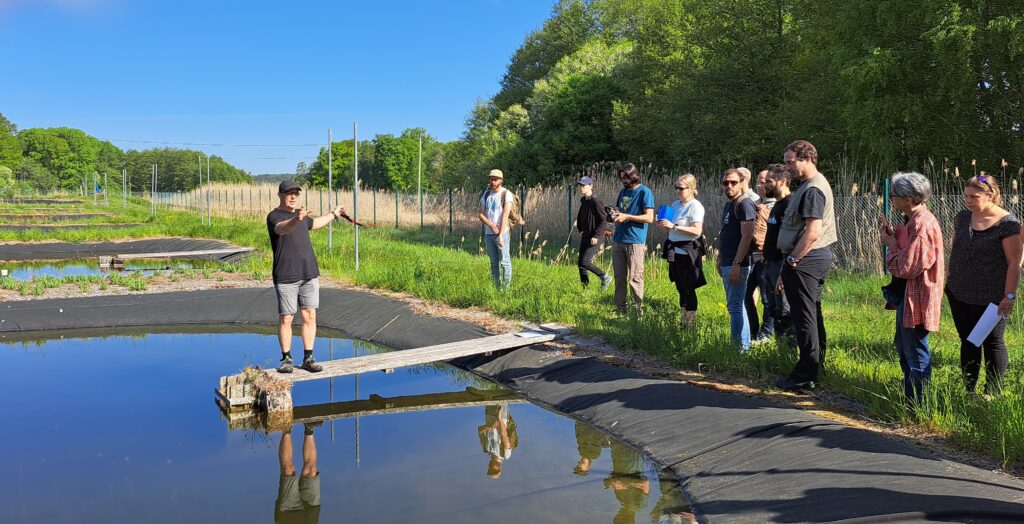


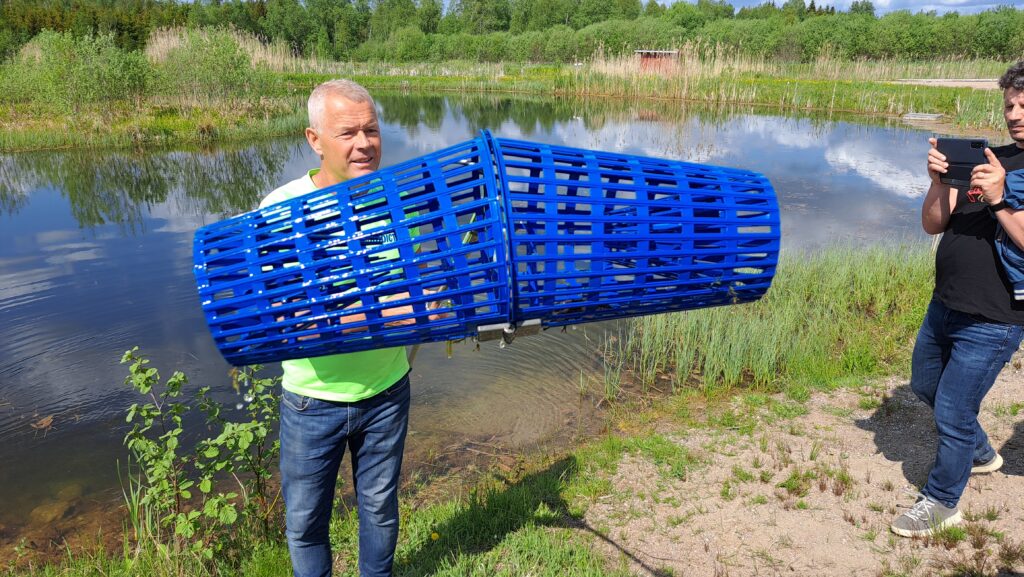
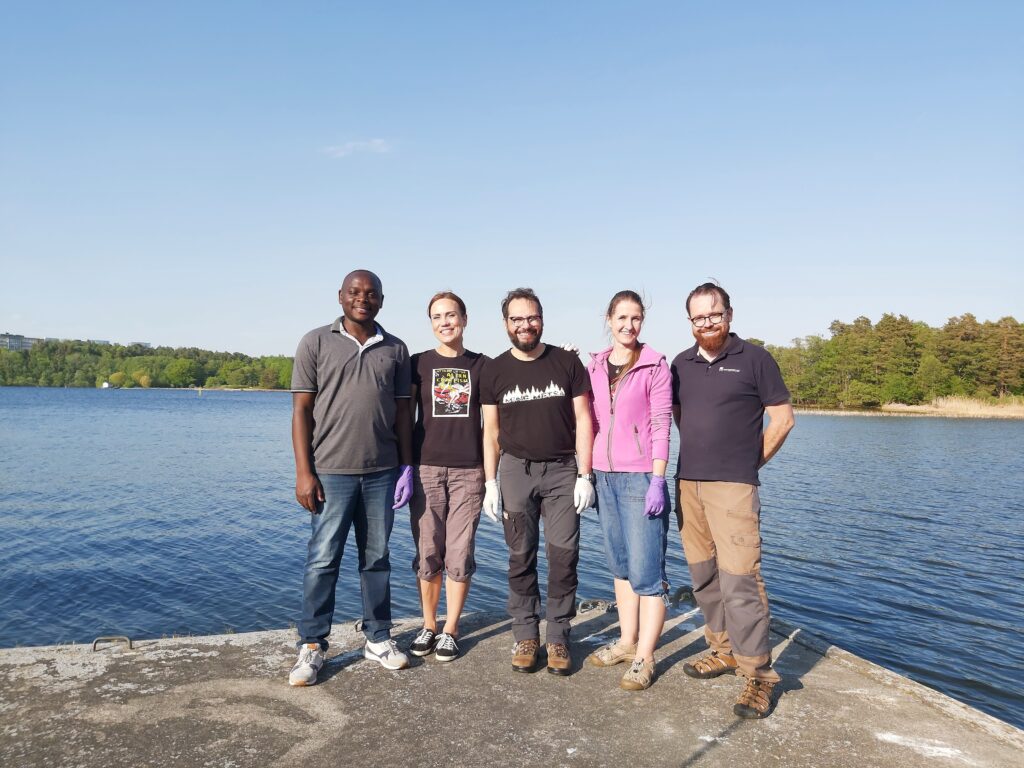
*************************************************************************
May 18, 2023
In order to draw attention to the invasive alien crayfish problem, a short educational video was broadcast on Virtsu-Kuivastu and Rohuküla-Heltermaa ferries during the summer (June-August).
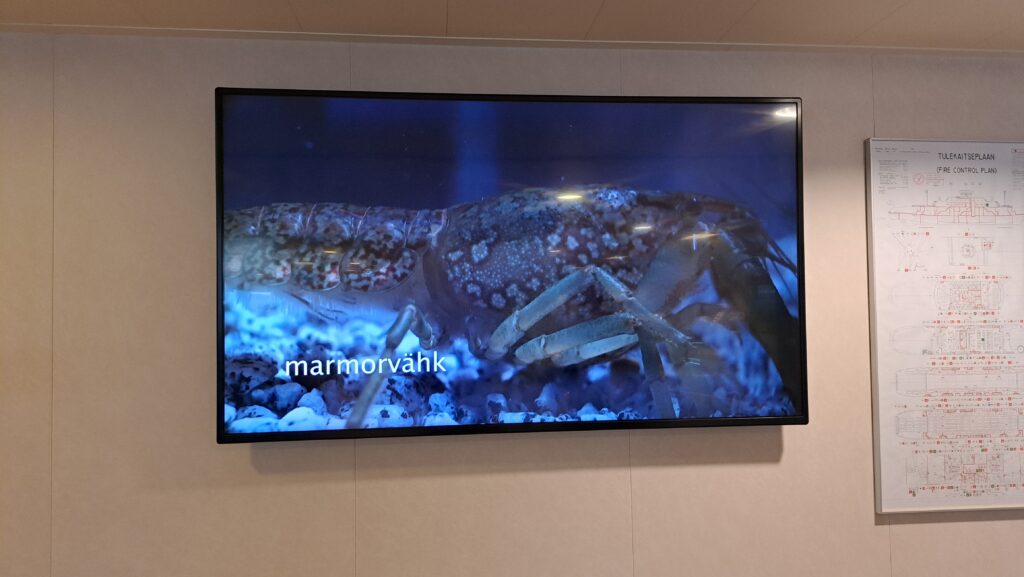
*************************************************************************
May 15, 2023
On 15th of May, the crew of Osoon (a weekly TV-show about nature and environment etc.) followed us around for a day to film a segment on invasive alien crayfish, their eradication options and new molecular detection methods.



Invasive alien crayfish segment was broadcast on 11th of September, 2023.
You can watch it here (in Estonian).
*************************************************************************
May 8, 2023
Project leader Katrin Kaldre gave an oral presentation to local goverment environmental specialists at a seminar on climate change mitigation and adaptation at the Tallinn Zoo Environmental Education Centre.
“Vähi võõrliikide ja väikese vesikatku levik Eestis ning tõrjevõimalused”
*************************************************************************
April 17, 2023
In the April issue of Kalale! Looduses a popular science article was published (in Estonian) by Katrin Kaldre and Lilian Pukk.
*************************************************************************
February 22, 2023
Two project financed educational videos were made:
- Shorter “Report a Sighting” video (in Estonian)
- Longer alien crayfish video (in Estonian)
Films were made by Remek Meel from Mustela.
*************************************************************************
January 13, 2023
Manuscript was submitted to the Special Issue of Diversity (Biological Invasions in a Changing World (NEOBIOTA 2022)).
“Distribution of Non-Indigenous Crayfish Species in Estonia and Their Impacts on Noble Crayfish (Astacus astacus L.) Populations”.
Update: article was published on 23rd of March, 2023
*************************************************************************
November 11, 2022
Project leader Katrin Kaldre gave an oral presentation (in Estonian) titled “Invasive alien crayfish and their impact on noble crayfish populations” at Tartu Surgeons Association seminar.
*************************************************************************
September 12-16, 2022
Members of the alien crayfish control team participated in a NEOBIOTA2022 international conference in Tartu, Estonia. The spread of invasive alien crayfish and their impact on the native Noble crayfish was presented to the conference participants with a poster titled “Distribution of non-indigenous crayfish species in Estonia and their threat to noble crayfish (Astacus astacus L.) populations”.
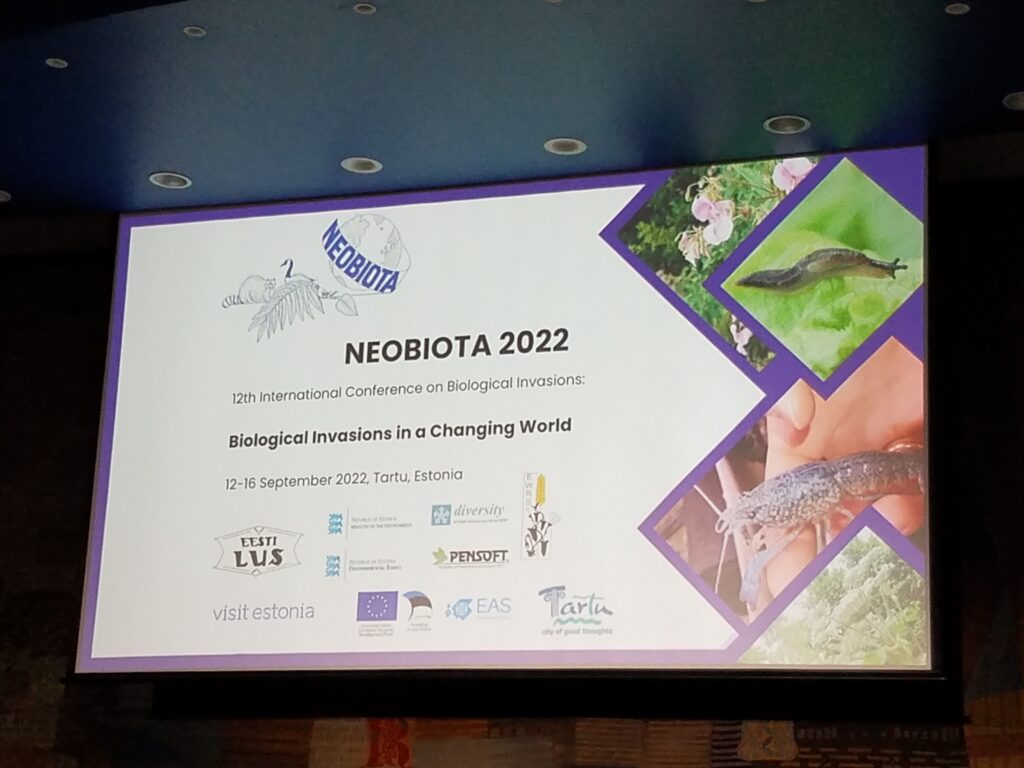
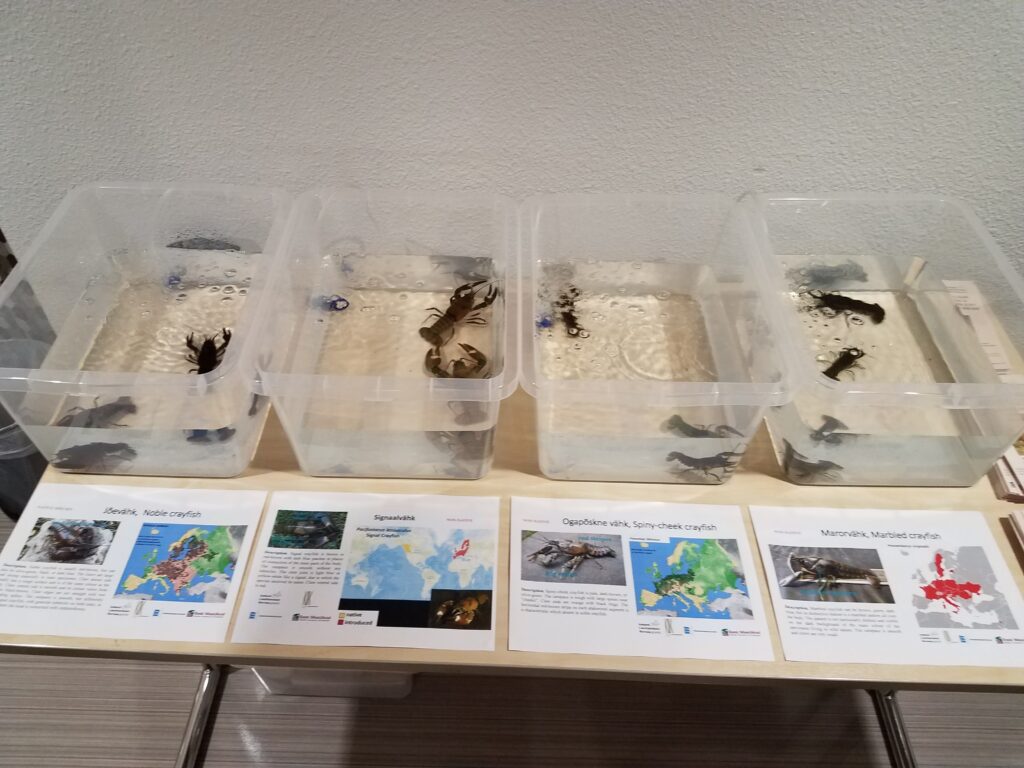

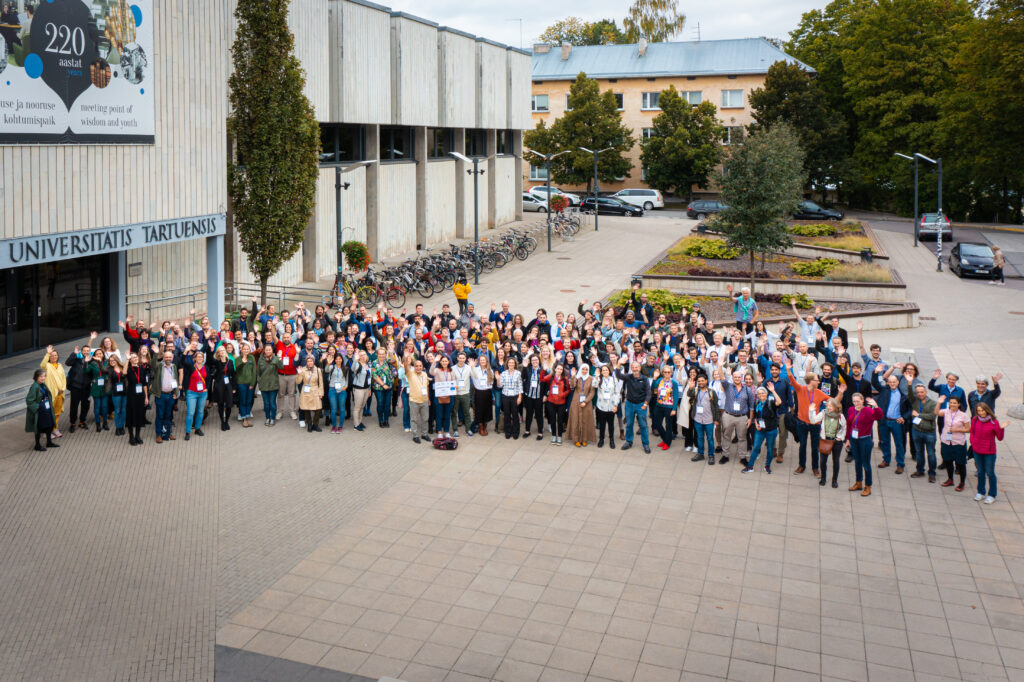
*************************************************************************
Practical training
Environmental protection officials were given practical training related to the eradication practices of invasive alien crayfish species.
On 16th of August at River Riksu, island of Saaremaa and 20th of September at River Vääna, Harju county.


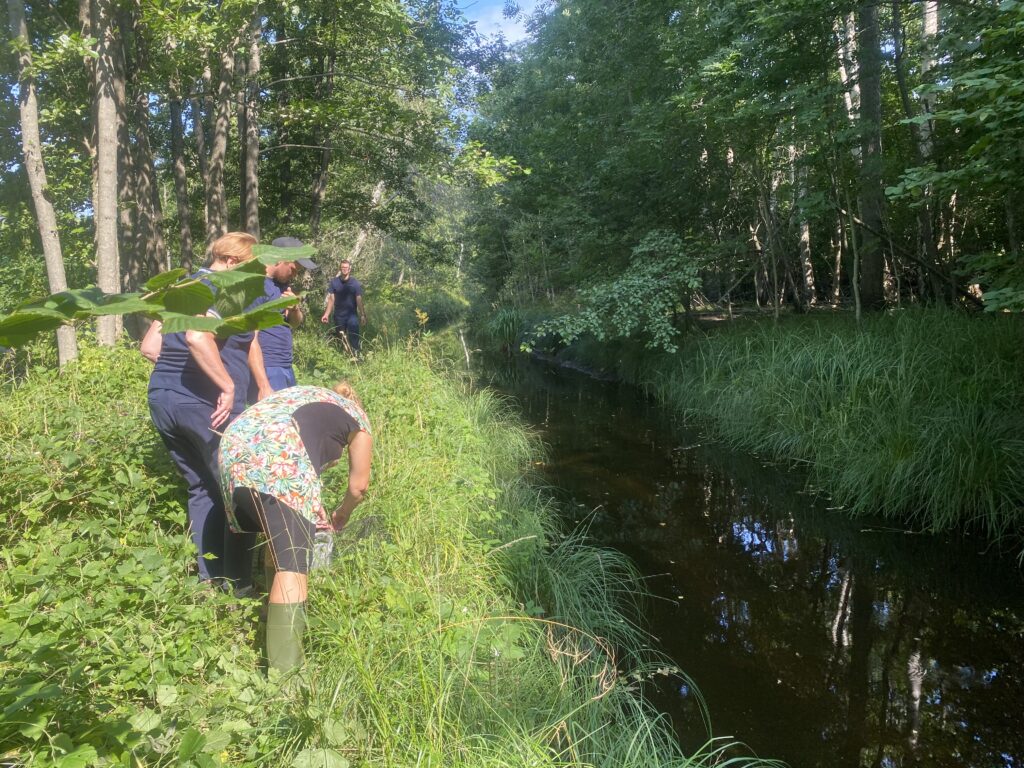

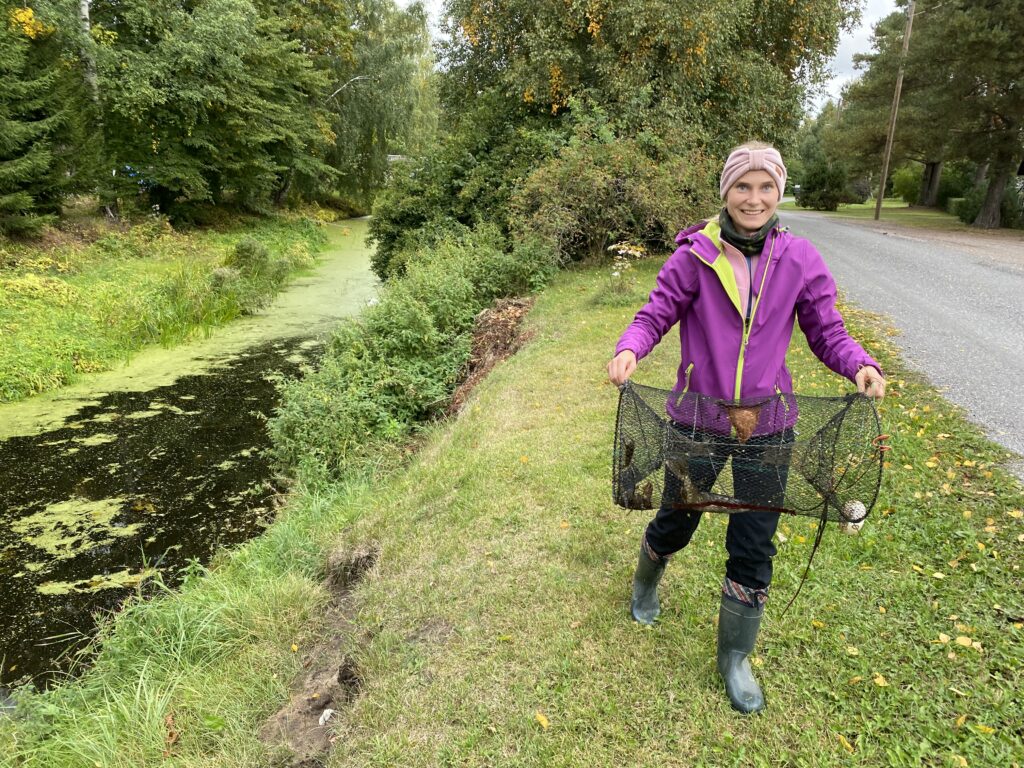
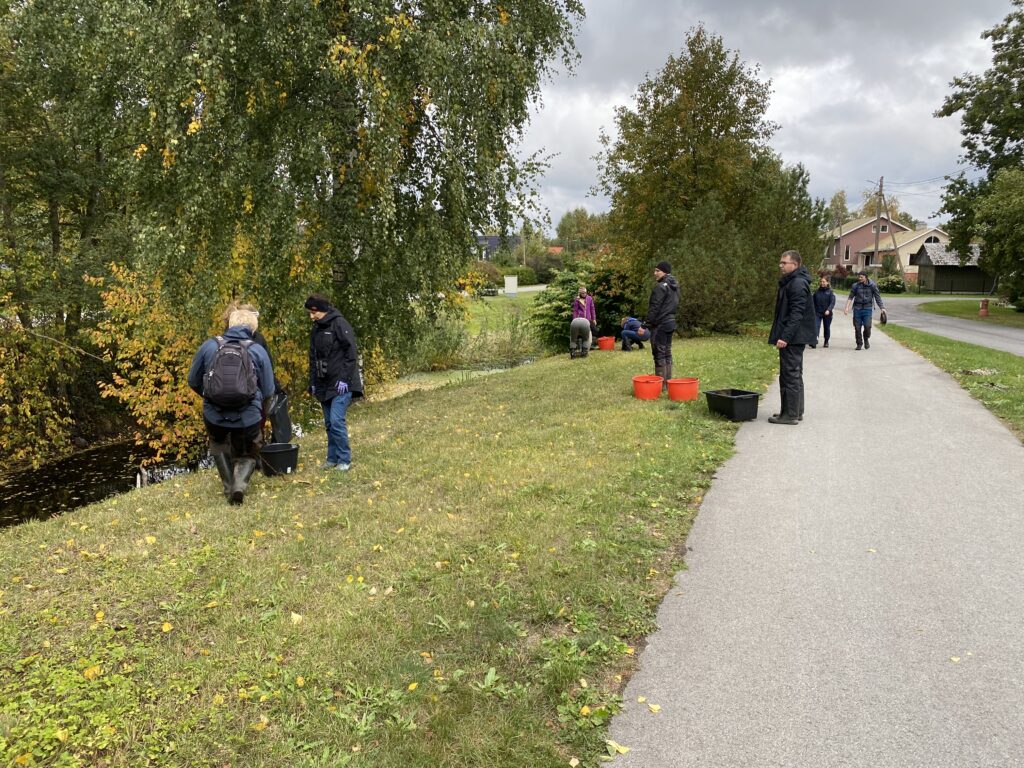
*************************************************************************
August 10, 2022
eDNA fieldwork started at Ilmatsalu river to detect invasive alien crayfish species and crayfish plague.
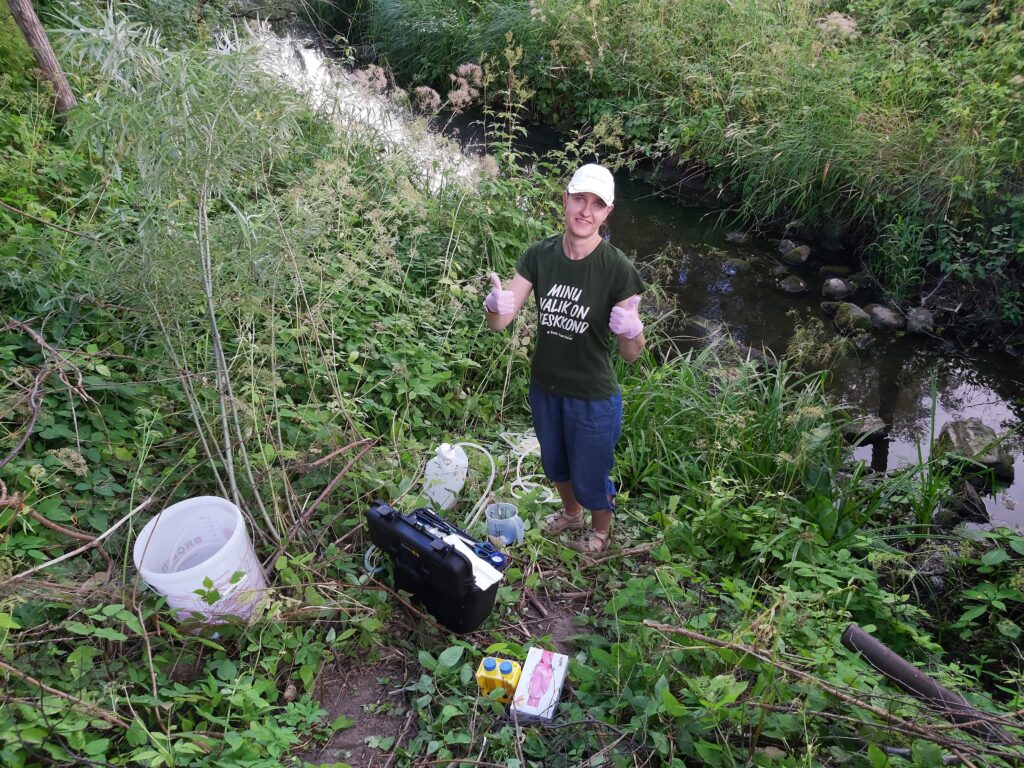
*************************************************************************
August 1, 2022
Crayfish catching season started on 1st of August!
Only Noble crayfish are allowed to catch with proper fishing licence. However, a number of alien crayfish species of North-American origin have been detected in Estonia, who carry deadly crayfish plague.
Knowing where they are will help prevent their further spread across Estonia.
For more information look under Report a Sighting tab!
*************************************************************************
June 20-25, 2022
Members of the alien crayfish control team participated in an international IAA23 conference in Czeck Republic. This conference brought together the crayfish scientists from around the world to discuss the problems of the spread of alien invasive crayfish species and crayfish plague and the possibilities of applying the latest eDNA methods in their detection. The conference provided useful knowledge and contacts on the implementation of the eDNA methodology.
*************************************************************************
June 14, 2022
Info seminar for inspectors from the field of fisheries and fisheries management
Programme
9.45 – 10.00 Registration
10.00 – 11.30 Distribution of alien crayfish species in Estonia. Identifying alien crayfish species and Nuttall’s waterweed. Margo Hurt, Katrin Kaldre
11.30 – 11.45 Coffee break
11.45 – 12.30 Alien crayfish species eradication methods. Katrin Kaldre Noble crayfish population genetic analyses and consultation possibilities. Lilian Pukk
12:30 – 13.15 Lunch
13.15 – 14.00 How to distinguish salmon and trout from each other. The state of salmon and trout populations in the Baltic Sea. Martin Kesler
14.00 – 14.20 Using Mobk app for checking the validity of special fishing licences. Aare Pai
14.20 – 14.30 Coffee break
14.30 – 16.00 Checking and providing special fishing licenses. How is the scientific fishing done and regulated. Elo Rasmann, Markus Vetemaa,
The project is funded through The European Economic Area (EEA) 2014-2021 grants “Climate Change Mitigation and Adaption” call I “Ecosystem resilience increased”.

*************************************************************************
April 4, 2022
Training “Prevention of the spread and practical eradication of aquatic invasive species”
Aim: to provide participants with necessary information how to prevent the problems caused by the spread of the aquatic invasive species. Also, give an overview of different eradication methods.
Output: participants can identify different crayfish species and recognise the Nuttall’s waterweed in the wild. They are also informed about the problems caused by the aquatic invasive species and know how to organise eradication projects.
Duration: 8 academic hours (4h theoretical, 4h practical)
Theoretical training: May 18, 2022 at 10.00 – 14.00 at 5 Kreutzwaldi St., room 2C5, Tartu.
Practical training: end of summer of 2022 (more information later)
Focus group: people whose work is related to environmental protection (e.g. Ministry of Environment, Environmental Board, and municipal officials)
The programme for the theoretical training on 18th of May, 2022, Tartu:
10.00 – 11.30 Who are the alien crayfish species in Estonia – how to identify them, which problems they cause and what are the different eradication methods. Introduction of eDNA methods for alien crayfish detection.
All presentations are in Estonian:
Presentation – Identifying alien crayfish species
Presentation – Alien crayfish eradication methods
Ettekanne – Introduction of eDNA methods
11.30 – 12.30 Lunch
12.30 – 14.00 Introducing Nuttall’s waterweed – characteristics, distribution, prevention and eradication methods.
Presentation – Nuttall’s waterweed (in Estonian)
Training is free, but space is limited! Please register no later than May 15th, 2022.
Training was carried out by: Margo Hurt, Katrin Kaldre, Lilian Pukk, Tõnu Feldmann, Katrit Karus, Helle Mäemets, Kadi Palmik-Das form Estonian University of Life Sciences. More information: katrin.kaldre@emu.ee
The project is funded through The European Economic Area (EEA) 2014-2021 grants “Climate Change Mitigation and Adaption” call I “Ecosystem resilience increased”.
*************************************************************************
March 31, 2022
Fresh from the press! New leaflets are now available in Estonian and Russian.
*************************************************************************
December 6, 2021
You can now watch the opening seminar presenations here (first three are in Estonian)!

*************************************************************************
November 18, 2021
Project opening seminar
Date: 3rd of December, 2021 at 10.00-12.00
Format: webinar
This project was funded through The European Economic Area grant “Climate Change Mitigation and Adaption” call I “Ecosystem resilience increased”. The main goal of this project is to help protect and restore native communities’ resilience to climate change by eradicating and controlling the spread of aquatic invasive species (AIS).
Programme:
10.00 – 10.30 Project introduction (Katrin Kaldre, Estonian University of Life Sciences, in Estonian)
10.30 – 11.00 Overview of Noble crayfish and alien crayfish species in Estonia (Margo Hurt, Estonian University of Life Sciences, in Estonian)
11.00 – 11.30 The role of native and invasive aquatic plants in Estonian freshwaters (Helle Mäemets, Estonian University of Life Sciences, in Estonian)
11.30 – 12.00 Eradication of alien Signal crayfish. Experiences from Norway (Roar Sandodden, Norwegian Veterinary Institute)
Everybody is welcome to participate.
Please register to the event no later than 1st of December here
More information: katrin.kaldre@emu.ee